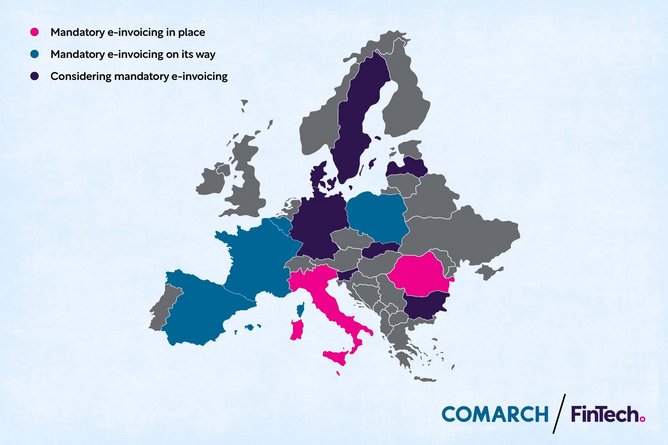Prepare for Europe-wide mandatory e-invoicing with Comarch

For a variety of different businesses – whether that’s banks, fintechs and financial institutions or airlines, telecoms operators and supermarkets – driving customer engagement is key to strong customer retention, and by extension repeat business. Acquiring new customers can be up to five times more expensive than retaining existing ones, highlighting how important it is to get customer engagement right.
But it’s not an easy endeavour; according to research from Comarch, 80% of consumers expect some form of incentive in return for their continued brand loyalty. The incentive needs to be carefully considered, as consumers have the option to switch to your competitor if their loyalty proposition is stronger than yours.
The great switch to e-invoicing
While European businesses struggle to engage their customers, they are also gearing up for a revolution in electronic invoicing. E-invoicing is an area where Comarch's competence has been very strong for many years. However, recent years have brought changes or announcements of their implementation by governments, which regulate electronic invoicing. This is mainly due to the desire to close the VAT loophole, which amounts to €11bn per month across the EU – or €4,000 per second. The problem is of course greater in more populous countries; Germany, France and Italy are the biggest culprits in VAT leakage in Europe, with almost €85bn in lost VAT each year. No wonder governments are considering making e-invoicing mandatory to avoid such huge tax losses.
Comarch believes that these changes will not only streamline tax issues, but will also bring many benefits to the companies themselves, such as improved invoice accuracy and data quality, various strategic and operational benefits for buyers, suppliers, and managers, enhanced productivity and improved global compliance, reduced instances of delayed payments and many others. Therefore, we believe that proactive action ahead of legal requirements in this area in a given country will allow companies to gain a competitive advantage by adapting to e-invoicing, instead of waiting for regulations. By 2025, electronic channels are expected to become the most popular way to exchange invoices worldwide. However, each country that makes e-invoicing mandatory will set its own rules, making it extremely difficult for global companies to comply with the rules in multiple jurisdictions.
When e-invoicing becomes mandatory in a country, companies will have to exchange documents in a specific format on a specific platform without exception. This is where Comarch can step in. The Comarch e-invoicing system enables automatic, secure invoicing that complies with the legal requirements of the countries where our clients operate - so you can continue to do business with the same suppliers and sellers while remaining legally compliant. This activity of Comarch on an international scale is especially important for companies that also operate internationally and have to meet the requirements in this area on a wider scale, bearing in mind that each local tax authority has different requirements, deadlines, and penalties for failure to comply.
What is the state of mandatory e-invoicing?

In January this year, Serbia introduced mandatory e-invoicing for companies in all industries. It joins Italy, which has already seen a €2bn increase in VAT revenue thanks to its own pioneer e-invoicing mandate. France, Spain, Poland, Belgium and Germany are set to introduce mandatory e-invoicing soon, with countries such as Denmark, Hungary and Portugal considering following suit.
Europe is following a trend that is also visible in other parts of the world. Countries such as Chile, Philippines, Saudi Arabia, Indonesia, Vietnam and Bahrain have implemented e-invoicing mandates or are about to do so, with some regulations going back more than 20 years. Australia was the last country to make e-invoicing mandatory for businesses in 2022.
“We can clearly say that this is already a global trend and as taxpayers, especially those doing business globally, we have a major challenge to adjust to these requirements,” says Małgorzata Chociaj, a Manager at KPMG Poland.
How can you respond to mandatory e-invoicing?
Remaining compliant should be the main priority for businesses, as fines can quickly add up and cause damage to a company’s bottom line and reputation. Penalties for breaking e-invoicing laws include 100% of the VAT amount in Italy; a fixed fee of 1,000 zloty (€217) for each missed invoice in Poland; or up to €15,000 per year in France.
The easiest way to remain compliant in multiple jurisdictions is to use a platform such as that provided by Comarch. It offers a powerful, use-friendly system that streamlines and automates a business’ accounts payable (AP) and accounts receivable (AR) functions.
Comarch e-Invoicing also provides a variety of innovative features including self-billing, e-archive, electronic signature, data validation, format conversion, and multichannel distribution to make the platform even more compelling for businesses.
To find out how your organisation could make good use out of Comarch’s system, just visit Comarch e-Invoicing.
- Sumsub: Identity Fraud up 73%; how can Fintechs React?Fraud & ID Verification
- Who is Anna Pruska, the new President of the Comarch Board?Banking
- Data: the silver bullet that hits regulatory moving targetsBanking
- Best practices for risk, regulation and data governanceFinancial Services (FinServ)






